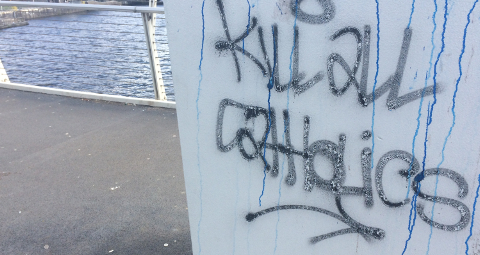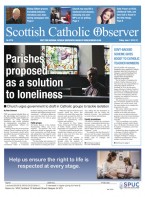BY Daniel Harkins | March 30 2018 | ![]() 0 COMMENTS
0 COMMENTS ![]() print
print

Call for review into funding of anti-sectarianism initiatives
Publication Date: 2018-03-30
Church and academics question effectiveness of schemes charged with tackling anti-Catholicism
The Catholic Church has backed a call by leading academics for an impartial non-governmental body to be set up to investigate government spending on anti-sectarianism initiatives.
Scotland’s leading historian Sir Tom Devine, emeritus professor at the University of Edinburgh, said the anti-sectarianism budget is simply ‘keeping people in a job,’ while the Church’s spokesperson said anti-Catholic hate crime in Scotland has risen in line with money spent combating it.
“It is interesting that when sectarianism was a virulent problem nobody mentioned it,” Sir Tom said. “Now when you can describe it as a process in decline then we have this array of public support for these [anti-sectarianism] charities.
“There should be an impartial, non-governmental enquiry into the use of this money and whether it is cost effective.”
Peter Kearney, director of the Scottish Catholic Media Office, said an ‘independent cost-benefit analysis would be a very good idea.’
“The question needs to be asked: are the programmes we are funding at the moment working?”
New funds
The Scottish Government this week announced £515,000 in funding for anti-sectarianism initiatives, saying they have provided £13.5 million for such work in the last six years.
Nil By Mouth will receive £95,000, the bulk of the new funds. The anti-sectarianism charity’s most recent accounts for 2017 show it receives 70 per cent of its funding from the Scottish Government.
However, academics have questioned weather the money is being spent appropriately, or goes to those who ‘simply re-cycle the established ‘wisdoms’ about so called ‘sectarianism.’’
Dr Joe Bradley of Stirling University said support for research into ‘ethno-religious’ bigotry needs to be ‘spread to some of the academics and activists who haven’t received anything previously—not just those who say what the Scottish Government and media want to hear.’
“We’ll get nowhere in terms of learning and understanding if it’s the same bodies, same academics, that get yet more money to say the same things: the things that actually just simply re-cycle the established ‘wisdoms’ about so called ‘sectarianism,’” he said.
Nil By Mouth director Dave Scott said the charity provides reports to all its funders which are ‘studied by a range of assessors’ including government ministers ‘to ensure they comply with the criteria any awards have been made under.’
“In terms of public funding our work must fulfil the recommendations of the various reports of the Independent Advisory Group on Sectarianism—the most widely researched, best-evidenced and thorough pieces of work ever carried out on the subject in Scotland,” he said.
Sir Tom and Mr Kearney were speaking following the annual St Patrick’s Day Festival lecture held in Coatbridge, where they debated the subject, ‘Sectarianism is largely a matter for historians and is not an issue in modern Scotland.’
In a combative debate, Sir Tom argued that sectarianism was a ‘semi-irrelevant’ phantom.
He said: “The beast is no longer red in tooth and claw but it is not dead yet. It may die in our generation, but I doubt it.”
He said that the ‘myth of Catholic victimhood in those areas that count—namely a fair crack of the whip in the labour market—has been proven to be false.’
Hate crime
Figures released last year showed Catholics to be the main victims of religiously aggravated hate crime. However, Sir Tom pointed to research by Dr Michael Rosie of Edinburgh University that argued the figures are misleading due to the larger number of potential anti-Catholic offenders in Scotland.
“Given the broad religious demography of the west of Scotland it would require only that a roughly equal (and small) proportion of Catholics acted in anti-social and ‘anti-Protestant’ ways as Protestants acting in ‘anti-Catholic’ ways to produce a supposed ‘disparity’ in offences,” the report states.
Mr Kearney, the Scottish bishops’ spokesman, disputed this view, saying sectarianism is ‘alive and well’ in Scotland. He said that a growth in government spending on tackling sectarianism has been matched by a growth in religious hate crime.
“The very word ‘sectarianism’ is a euphemism,” Peter Kearney said, arguing that the issue is unique in public policy in that its constituent parts are not broken down, defined and analysed. “It remains a blanket problem never to be defined,” he said, adding that ‘anti-Catholicism may be Scotland’s default setting.’
The Scottish Government took steps this week to finally define sectarianism, tasking Professor Duncan Morrow with chairing an independent working group to come up with a legal definition.
Sir Tom Devine called during the St Patrick’s debate for a firm definition of sectarianism, describing it as ‘an extended and generalised culture of treating people improperly in terms of their belief or what is considered to be their belief.’
Asked if they would support an independent review of the funding of anti-sectarianism initiatives, a Scottish Government spokesperson pointed to a recent review by consultancy firm Wren and Greyhound Limited.
“We recently commissioned an independent non-governmental evaluation of community based projects between 2012 and September 2016 which clearly demonstrates the positive impact that this work is having,” the spokesperson said.
“The findings were shared with representatives from the Catholic Church in a meeting with Scottish Government officials last August, and at a further meeting between the church and the minister for community safety and legal affairs last September.
“We fund organisations such as Nil by Mouth and others, who work directly with young people and adults to deliver projects directly tied to the recommendations of the review of the Independent Advisory Group on Tackling Sectarianism in Scotland.”











